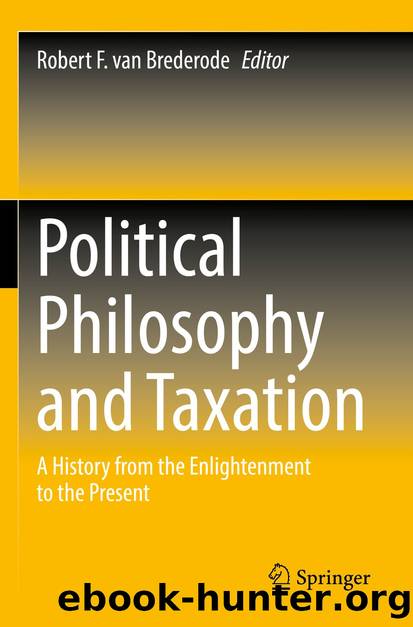Political Philosophy and Taxation by Unknown

Author:Unknown
Language: eng
Format: epub
ISBN: 9789811910920
Publisher: Springer Nature Singapore
6.2.2 Variety and Complexity of Man and Society
Although conservatives have discerned in human beings an instinct for sociability, they have also recognized that individuals and social groups hold many differences. The importance of variety is thus integral to the conservative disposition toward taxation. According to this view, while all individuals were equal under God, they were unequal in many other respects, including in experiences, talents, abilities, skills, knowledge, social status, and family pedigree. âIn all societies, consisting of various descriptions of citizens, some description must be uppermost,â Burke wrote in the Reflections, defending the idea of an aristocracy. âThe levellers therefore only change and pervert the natural order of thingsâ (Mitchell 2007, 100). It followed that differences in wealth, among a myriad of social and economic indicators, were reflections of naturally forming distinctions among human beings. Robert Nisbet gave voice to this keystone of conservative sociology in the twentieth century. âVariations among individuals, in strength, intelligence, age, aspiration, ability of whatever kind, and aptitude, will always tend toward the creation of inequality of result,â he insisted in Twilight of Authority (Nisbet 2000, 191). Equality under God for conservatives did not mandate equality of condition.
Similarly, the many distinctions among man disclosed the complex nature of society. âThe nature of man is intricate; the objects of society are of the greatest possible complexity; and, therefore, no simple disposition or direction of power can be suitable either to manâs nature, or to the quality of his affairs,â Burke observed in the Reflections (Mitchell 2007, 112). More than a century later Winston Churchill (1874â1965) delivered this classic Burkean argument when highlighting the chasm between British Prime Minister H.H. Asquithâs rationalist certitudes and the ambiguities of reality:
The world, nature, human beings, do not move like machines. The edges are never clear-cut, but always frayed. Nature never draws a line without smudging it. Conditions are so variable, episodes so unexpected, experiences so conflicting, that flexibility of judgment and a willingness to assume a somewhat humbler attitude towards external phenomena may well play their part in the equipment of a modern Prime Minister (Churchill 1991, 83).
Download
This site does not store any files on its server. We only index and link to content provided by other sites. Please contact the content providers to delete copyright contents if any and email us, we'll remove relevant links or contents immediately.
Machine Learning at Scale with H2O by Gregory Keys | David Whiting(4313)
Never by Ken Follett(3958)
Harry Potter and the Goblet Of Fire by J.K. Rowling(3860)
Fairy Tale by Stephen King(3400)
Unfinished: A Memoir by Priyanka Chopra Jonas(3391)
The Man Who Died Twice by Richard Osman(3081)
Will by Will Smith(2922)
It Starts With Us (It Ends with Us #2) by Colleen Hoover(2369)
Rationality by Steven Pinker(2367)
Can't Hurt Me: Master Your Mind and Defy the Odds - Clean Edition by David Goggins(2343)
The Dark Hours by Michael Connelly(2311)
The Storyteller by Dave Grohl(2238)
Friends, Lovers, and the Big Terrible Thing by Matthew Perry(2231)
The Dawn of Everything: A New History of Humanity by David Graeber & David Wengrow(2210)
The Becoming by Nora Roberts(2205)
The Stranger in the Lifeboat by Mitch Albom(2123)
Cloud Cuckoo Land by Anthony Doerr(2114)
Love on the Brain by Ali Hazelwood(2079)
Einstein: His Life and Universe by Walter Isaacson(2026)
